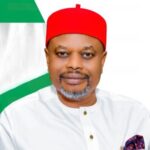The Minister of Information and Culture, Lai Mohammed, has said his ministry will create two million additional jobs within the next three years in line with the Buhari administration’s determination to move 100 million Nigerians out of poverty.
Mohammed made this known to State House correspondents at the end of the sixth virtual meeting of the Federal Executive Council (FEC), presided over by President Muhammadu Buhari at the State House, Abuja, on Wednesday.
- 774,000 Jobs: National Assembly asks FG to stop recruitment exercise
- Keyamo, lawmakers clash over FG’s 774,000 jobs
The News Agency of Nigeria (NAN) reports that the minister had earlier presented to the Council, the Ministerial Performance Report of the ministry, covering the period August 2019 to June 2020.
According to the minister, the Cultural Industrial Centres, which are scattered all over the country, are capable of creating 500,000 jobs within the next three years, as the nation can have some 100,000 jobs from the restoration of museums, especially in Lagos, Plateau and Kwara.
He said: “But the good news, as contained in today’s presentation, is that the Ministry of Information and Culture is set to create over 2 million jobs within the next three years.
“We are doing this through the implementation of deliverable number seven, which mandates us to collaborate with the private sector to create jobs for the youth.
“The number one job creator under the Ministry of Information and Culture is the Digital Switch Over (DSO) in broadcasting, which is set to create one million jobs in the next three years through the manufacturing of set-top-boxes (decoders) and TV sets, TV and Film production, as well as TV and Online advertising and Data, among others.”
According to the minister, the DSO will also fetch 100 million dollars from the collection of TV licences and Digital Access Fess, as well as one billion dollars from the sale of the spectrum that would be vacated once the Analogue to Digital migration has been completed.
He disclosed that the ministry had so far rolled out the DSO in five states (Enugu, Osun, Kwara, Kaduna, and Plateau) as well as the Federal Capital Territory, while efforts had been intensified to extend the rollout to all parts of the country.
Muhammad, who noted that the negative impact of COVID-19 on the economy had affected all sectors in Nigeria and around the world, said the Creative Industry had been hit harder than any other sector.
According to him, this is so because the industry is the most people-centred, and with social distancing and the ban on mass gathering, the industry is now grappling at straws.
He explained that the ongoing reform of the Broadcast and Advertising Industries was aimed at strengthening the industries so they could live up to their billing and generate more job opportunities.
The minister expressed optimism that the ongoing reform in the broadcast industry would, among others, propel revolutionary advantages in the area of promoting entrepreneurship in the local industry.
“As for the Advertising Sector, bringing Nigeria’s TV advertisement market to what it should be, which is three times its current size, could result in additional $200-400 million dollars revenue to the industry, in addition to creating thousands of jobs,’’ he said.
The Minister of the Federal Capital Territory (FCT), Alhaji Muhammad Bello, who also addressed the correspondents on the outcome of the meeting, said the Council approved about N6.7 billion for the construction of roads in Abaji Area Council of the FCT.
He revealed that the N4.6 billion of the amount would be expended on the construction of a road linking Yaba to Gurdi road in the area, while the remaining N2.1 billion would be spent on the third phase of the construction of township road within the Abaji city centre.
The minister said: “During the Federal Executive Council, I presented two memos on the FCT and both were on infrastructure projects in the satellite towns.
“The first one is the award for the construction of a road linking Yaba to Gurdi road in Abaji Area Council and that contract was approved for N4,648,255,381.42 with a completion period of 20 months.
“Already the company is constructing the road linking Yaba town to the main Abuja-Lokoja expressway; so this road is meant to open up the rural community which is very agrarian with a lot of water resources. As a matter of fact, it is the area where we usually have the FCT fishing festival.
“The second contract is for the third phase of the construction of roads within the city of Abaji which is in the southern tip of the FCT.
“This is about 8.4 kilometres and is intended to complete and complement the other roads that are already there.
“The contract is in the sum of N2,128,176,102.50 with a completion period of six months and this will upgrade the infrastructure in Abaji town.”

 Join Daily Trust WhatsApp Community For Quick Access To News and Happenings Around You.
Join Daily Trust WhatsApp Community For Quick Access To News and Happenings Around You.


